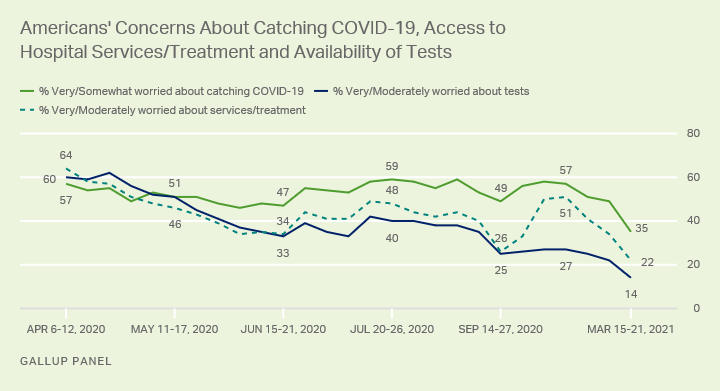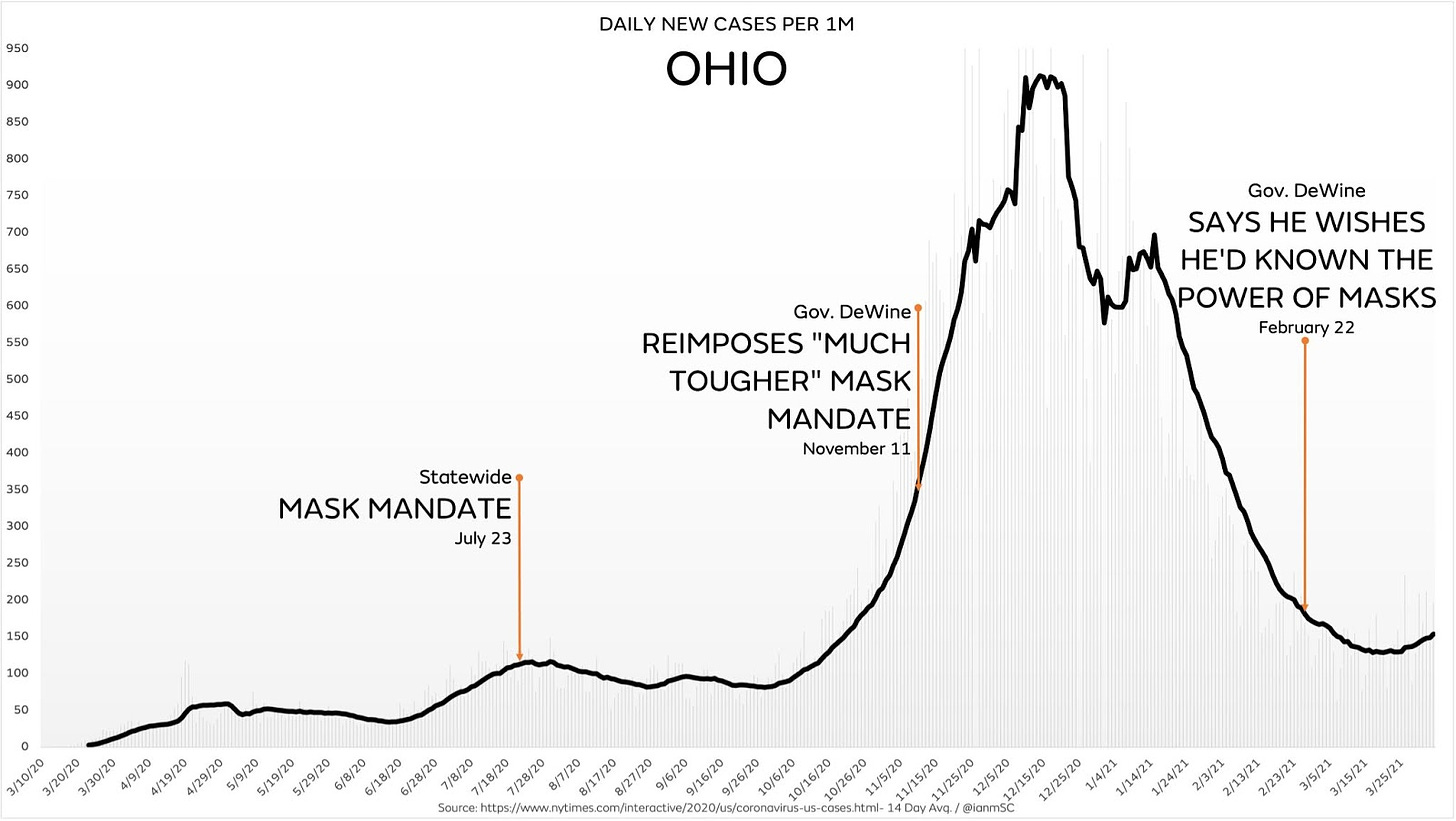Freedom to Worship versus Lockdowns
Across the world last week, people celebrated Good Friday and Easter, despite disapproval and even risk of punishment from authorities.
Latest polls show Americans’ worry about contracting COVID has dropped to record lows.
Free states and lockdown states continue to pursue opposite policies. Kansas lawmakers voted to rescind Governor Laura Kelly’s mask mandate within hours of the governor issuing the executive order. But in California, people will be required to get a COVID test or show proof of vaccination in order to attend an indoor reception, meeting, or conference beginning April 15.
Our Michael Betrus discusses problems with several CDC studies.
Great Barrington Declaration co-author Dr. Sunetra Gupta debates Dr. Gabriel Scally on the question “Is eliminating Covid-19 worth it?”
Noah Carl makes the case that the “Focused Protection” strategy advocated by the authors of the Great Barrington Declaration would have resulted in fewer deaths than did lockdowns.
Drs. Jay Bhattacharya and Martin Kulldorff review California’s calamitous response to COVID.
The cops’ invasion of a Polish Catholic mass in South London is genuinely chilling, says Brendan O’Neill at Spiked.
Want to support our work? Visit our Substack page and leave us a tip.
COVID News
The world’s second Easter under pandemic brings more restrictions and a few bright spots
https://www.washingtonpost.com/world/2021/04/03/easter-coronavirus-world-restrictions/
During Easter season last year, the language of “social distancing” and “flatten the curve” was still novel for many Christian communities and clergy as they tried to adapt to the realities of the coronavirus.
Priests filled empty pews with photos of their congregants. Others held drive-by Easter services for worshipers. Masks and family Zoom sessions found their place alongside long-standing traditions, such as Easter meals and egg hunts.
Little is different as many Christians celebrate Easter this Sunday, but there are some bright spots as vaccination levels rise and some restrictions ease.
In Canada, where several provinces imposed new rules this week to temper a variant-fueled resurgence of coronavirus cases, officials from all levels of government and political stripes urged against in-person Easter gatherings with those outside one’s household, particularly those held indoors.
Kansas lawmakers revoke Democratic governor's mask mandate
https://www.washingtonexaminer.com/news/kansas-law-governor-laura-kelly-mask-mandate-revoked
Kansas lawmakers voted to rescind Gov. Laura Kelly’s mask mandate within hours of the governor issuing the executive order.
“Public health mandates should be short-term, data-driven, and reserved only for pressing emergency situations. They should not be used to dictate Kansans’ daily lives year after year,” Speaker of the Kansas House Ron Ryckman and Kansas Senate Majority Leader Dan Hawkins said in a statement on the decision. "If data is the real driver behind the Governor’s approach, then let’s rely on the numbers.”
The Kansas Legislative Coordinating Council met Thursday to review 13 executive orders issued by the governor, and lawmakers revoked the order in a 5-2 vote. The vote repealed the statewide mandate, but cities and localities are free to institute their own orders.
On Thursday, Kansas recorded an average of 6 cases of COVID-19 per 100,000 people, according to data provided by the Mayo Clinic. Speaking in opposition to the revocation, Senate Minority Leader Dinah Sykes acknowledged that Kansans are “all tired of the face mask mandate,” but she urged the council to keep the statewide mandate in place because removing it may send “the wrong message.”
Americans' Worry About Catching COVID-19 Drops to Record Low
https://thehill.com/policy/healthcare/545670-battle-rages-over-vaccine-passports
WASHINGTON, D.C. -- At the same time Americans' satisfaction with the rollout of the COVID-19 vaccine has surged, their concerns about getting the virus and about the availability of coronavirus tests and hospital services/treatment have fallen to record lows.
Thirty-five percent of U.S. adults now say they are very or somewhat worried about contracting COVID-19, the lowest point in Gallup's trend since April 2020. Twenty-two percent of Americans are very or moderately worried about access to hospital services/treatment, and 14% are just as worried about access to COVID-19 tests.
These data come from Gallup's latest COVID-19 probability-based web panel survey, conducted March 15-21 as vaccination rates continued to climb across the country. The current 35% worried about contracting COVID-19 is down 14 percentage points from February, and well off the record-high 59% of Americans who voiced concerns about catching the disease last summer. That high came as the number of COVID-19 cases surged following the lifting of restrictions on businesses in June.
Worry about contracting COVID-19 is down among almost all key segments of society since February, especially among older adults. The decline among older Americans, and the decline more generally, may be tied to the increase in the percentage of Americans who are fully vaccinated. That group has one of the lowest levels of worry among all major subgroups, with 21% (down from 36%) expressing concerns about getting COVID-19.
COVID-19 Tests or Proof of Vaccination Required for Indoor Meetings, Receptions, Conferences in California
According to the California Department of Public Health, people will be required to get a COVID-19 test or show proof of being fully vaccinated to attend an indoor reception, meeting, or conference beginning April 15.
It’s welcome news for Suher Haidar, a wedding and events planner in San Diego.
"I have a May 15 event for 100 guests that we wanted to have done at a venue and fingers crossed that's going to be approved," Haidar said.
She’s had at least 17 events canceled because of the pandemic and now that the state is providing guidance for the events industry, she said she’s seeing light at the end of the tunnel.
"When we last spoke it was three households, and now its 50 and 100 capacity. We have guidelines," said Haidar, relieved.
Commentary/Analysis
The duel: Is eliminating Covid-19 worth it?
Yes—Gabriel Scally
The destruction wrought by Covid so far is monumental. This virus has inflicted disease and death wherever it has been permitted to. So of course elimination is the safest UK policy.
That is how we deal successfully with other dangerous infectious diseases. Elimination is often confused with eradication, which means no cases occur anywhere in the world, so countries can drop all preventive measures. Eradication of the virus entirely is unfortunately not achievable in the foreseeable future. But we can and should aim to prevent cases within the UK from spreading.
As vaccination continues to deliver substantial reductions in deaths, we need to think ahead about what measures will be required to stop sporadic outbreaks or resurgence. Continued protection against new variants may necessitate the development of modified vaccines.
The CDC jumps the shark
https://rationalground.com/the-cdc-jumps-the-shark/
The media, politicians, and healthcare leaders have one-upped each other on COVID-19 restrictions for a year. For example, the Wisconsin Department of Natural Resources wanted their employees to wear masks. At home. While on Zoom calls. Pennsylvania told their residents to wear masks at home. Dr. Theresa Tam, Canada’s top health official, told everyone to wear a mask while having sex with a new partner.
Then it happened. We reached our peak. But like the COVID-19 waves, there were three peaks. The CDC gets credit for all of this. It’s disheartening to pick on the CDC because there are some brilliant doctors and scientists that do incredible work. Still, it’s clear that after COVID-19, the leadership needs a change. They jumped off the mountain of public healthcare twice and flew off in a wing suit, trying to achieve Zero-COVID-19. If you follow extreme sports, you know how dangerous that can be. Just look up climbing great Dean Potter.
I watched Happy Days as a little kid. Even before the expression “jumping the shark” became a commonplace term, seeing Fonzie in real time, jumping a shark on waterskis while wearing a leather jacket, was just too much.
Businesses have created products that jumped the shark. Many television shows have jumped the shark. You’ve probably had a dinner party when someone made a comment so over the top that you had to look down to see if they were wearing waterskis.
The CDC did it with two different directors.
What Would a Focused Protection Strategy Have Looked Like?
https://lockdownsceptics.org/what-would-a-focused-protection-strategy-have-looked-like/
In a previous article, I argued that the UK’s lockdowns were probably a mistake. Lockdowns have not been associated with substantially fewer deaths from COVID-19, except in geographically peripheral countries that imposed strict border controls at the start. The increases in mortality associated with COVID-19 – even in the worst hit Western countries – have been small relative to pre-existing differences. And the societal costs of lockdowns have been substantial, with preliminary analyses suggesting they almost certainly outweighed the benefits.
However, as I noted last time, none of this implies the optimal approach to COVID-19 was ‘do nothing’. COVID-19 is a deadly disease, and the pandemic clearly warranted government action. So what approach should the British Government have taken? I will argue that a focused protection strategy would have been more effective than the policy of intermittent lockdowns. Since the majority of the UK’s age-adjusted excess deaths occurred in the first wave, I shall focus on actions that could have been taken during the crucial months of February and March 2020.
Before proceeding, there’s another alternative approach I want to briefly consider. The Government could have followed China, and imposed a highly restrictive Wuhan-style lockdown in, say, early March – for as long as it took to get case numbers down. At the same time, it could have implemented some combination of travel bans and border quarantines to prevent new cases being brought in from outside. This approach might have proven more effective and less damaging to the economy than its actual policy of intermittent lockdowns, or the alternative policy of focused protection. However, there are several reasons to believe it would not have worked in the UK.
California's Failed Response To COVID
https://www.hoover.org/research/californias-failed-response-covid
Now that we’ve “celebrated” the first anniversary of COVID-19 in California, it’s a good time to take stock of the state’s response.
From the beginning, the Golden State has taken an aggressive stance toward the epidemic, including imposing the earliest shelter-in-place order in the nation; ceasing in-person schooling for the vast majority of public-school kids; shuttering churches, parks, and playgrounds; mandating masks, with hefty fines for violators; and forcing the closure of “non-essential” businesses that cannot operate using distancing technologies, such as videoconferencing. Even Disneyland has been closed since March 2020. In short, California has followed one of the strictest lockdowns in the country.
Though the state’s response received high marks in July from the “covidian” high priesthood, including Dr. Anthony Fauci, the state has seen exploding coronavirus cases and deaths. Through March 28, 2021, 8.9 percent of all Californians have been identified as COVID cases—3.6 million cases. Since most infections are not recognized as cases, a much larger fraction of the population has been infected with COVID. Through March 29 this year, nearly 57,800 people have died in California with COVID.
To put these numbers in perspective, it helps to have a comparison state that has followed a very different policy. For that, we should consider Florida, which partially lifted its lockdown in May 2020 and then further relaxed restrictions in September (based in part on focused protection ideas advocated by us).
In sharp contrast to California, in Florida most schools and universities have been open for in-person instruction since the fall, normal human activities—sports, church going, visits to the park—occur with regularity, and businesses have been open for in-person activities. Local ordinances can recommend masks and social distancing and impose indoor-capacity limitations but cannot mandate closures, as is the case in California. Disneyworld has been open since July. At the same time, Florida increased testing and protection within its nursing homes to reduce the risk of COVID among its most vulnerable residents.
Research
Exposure to SARS-CoV-2 generates T-cell memory in the absence of a detectable viral infection
https://www.nature.com/articles/s41467-021-22036-z#Abs1
Abstract:
T-cell immunity is important for recovery from COVID-19 and provides heightened immunity for re-infection. However, little is known about the SARS-CoV-2-specific T-cell immunity in virus-exposed individuals. Here we report virus-specific CD4+ and CD8+ T-cell memory in recovered COVID-19 patients and close contacts. We also demonstrate the size and quality of the memory T-cell pool of COVID-19 patients are larger and better than those of close contacts. However, the proliferation capacity, size and quality of T-cell responses in close contacts are readily distinguishable from healthy donors, suggesting close contacts are able to gain T-cell immunity against SARS-CoV-2 despite lacking a detectable infection. Additionally, asymptomatic and symptomatic COVID-19 patients contain similar levels of SARS-CoV-2-specific T-cell memory. Overall, this study demonstrates the versatility and potential of memory T cells from COVID-19 patients and close contacts, which may be important for host protection.
Charts and Graphics
International News
Now the police are breaking up Good Friday services
https://www.spiked-online.com/2021/04/03/now-the-police-are-breaking-up-good-friday-services/
There have been many shocking and even despicable acts of authoritarianism over this past year of lockdown. And right up there are the events that took place at a Polish Catholic church in south London yesterday. On Good Friday, the most solemn day in the Catholic calendar, police officers walked into the church, proceeded to the altar and instructed the congregation to go home or face arrest. It captures, better than anything I’ve seen, how thoroughly Britain has lost its way as a result of the hysteria and illiberalism of the Covid crisis.
It looks like something out of a tinpot tyranny. The church service was being livestreamed online. Halfway through, two cops appear and arrogantly walk to the sanctuary itself, the area around the altar. They then take over the lectern from the priest and issue a dire warning to the people who had gathered to commemorate the darkest day in the Christian faith – the trial and execution of Christ. ‘You need to go home’, an officer says. ‘Failure to comply with this direction to leave… could lead you to be fined £200 or, if you fail to give your details, to you being arrested.’
Long-term care residents beg to go outside after year-long COVID-19 confinement
https://www.cbc.ca/news/canada/toronto/long-term-care-covid-confinement-1.5969825
Residents of Ontario's long-term care homes begged on Tuesday to be allowed outside, saying anti-pandemic restrictions that have confined them indoors for more than a year make no sense given almost all have now been vaccinated.
Some compared their situations to solitary confinement, and urged the provincial government to act on what they called a gross violation of their basic human rights.
Chuck Ferkranus, a resident of a home in Newmarket, Ont., said no one in the building has COVID-19 and yet residents are stuck in their rooms. Ferkranus, who challenged those in authority to live as he does for even a week, said residents are being treated worse than criminals.
"We did nothing wrong; we're not guilty of any crime," he said. "If vaccinations don't end the rules, if no one having COVID doesn't end the restrictions, then what does it take before this comes to an end?"
Many of an estimated 150,000 nursing home residents have been confined to their rooms or floors for as long as 15 months now, cut off from most relatives as well as the outdoors. Activists blame extreme staffing shortages and operators who prioritize corporate needs ahead of the welfare of residents.







